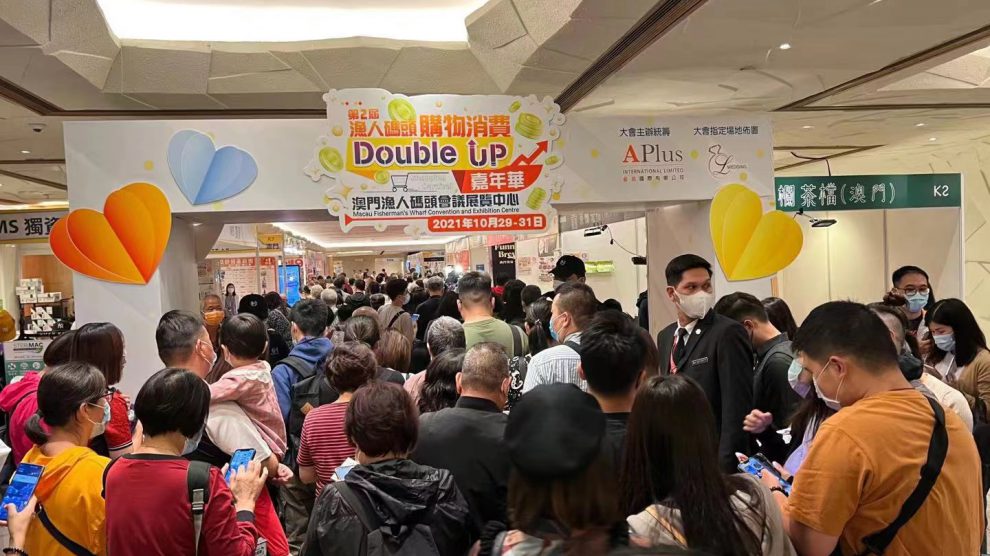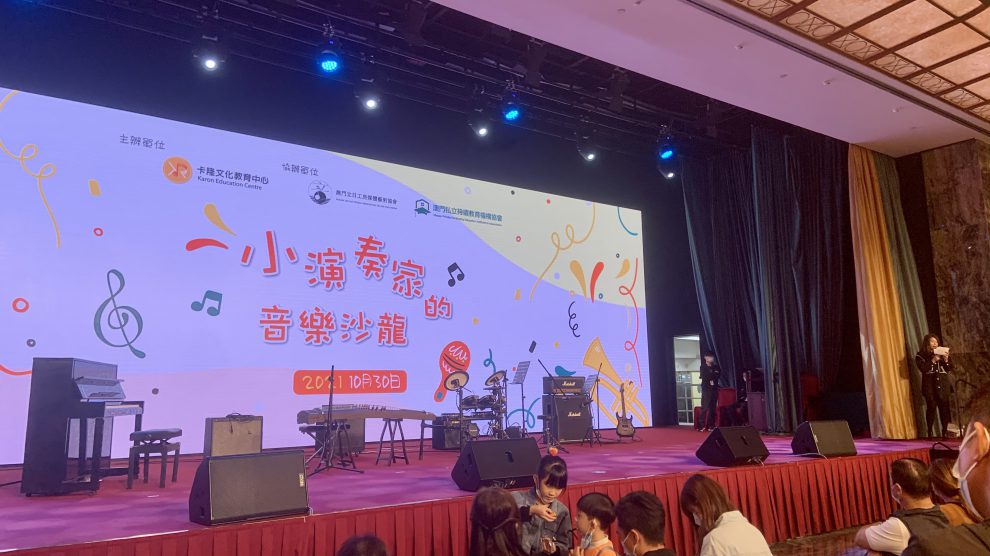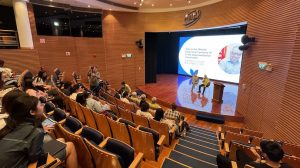IFTM Adjunct Instructor Mr. Geraldo Tou recently took a group of IFTM undergraduates on a field trip to Macau Fisherman’s Wharf Convention and Exhibition Centre, to attend an exhibition focused on consumer shopping. During the activity, students exchanged opinions with on-site staff, while getting a better understanding of how this type of show operates and meets customer needs in an innovative way.
The field trip was targeted at undergraduates enrolled on English-language programmes attending the Entrepreneurship course. The visit took place on 30 October.
The students toured the ‘2nd Double Up Shopping Carnival’, discussing areas of improvement for the exhibition, and putting forward potential innovative solutions on how to boost the event’s competitive advantages. That was followed by an exchange with an event manager from Macau Fisherman’s Wharf Convention and Exhibition Centre. The exchange was to discuss the relevance and feasibility of implementation regarding the students’ innovative ideas for addressing so-called ‘pain points’ identified by them when attending the exhibition.
“Instructor Mr. Tou often invites us to join different activities, so that we can learn from real-world cases, rather than only from textbooks,” says Year 4 student Thomas Hong Kueng Kueng, who attended the field trip. He is enrolled on the Tourism Event Management Bachelor’s Degree Programme.
Thomas says one of the things he learned from the field trip was that, since the start of the pandemic, there is a trend for events to be held concurrently, i.e., with similar activities at the same venue, in order to generate synergies of various sorts. “Take the shopping carnival we visited as an example,” he says. “It was jointly held with the A+ Education Expo, in the same venue.”
The IFTM student argues field trips are beneficial for students, enhancing overall learning outcomes. “We sit in the classroom most of the time. Such kind of ad hoc site visit helps us a lot,” says Thomas. “Going on a field trip requires student engagement and stimulates observation, leading to a more in-depth understanding of topics,” he says.
Student Gigi Ng Pui Chi is also pursuing a Bachelor’s Degree on Tourism Event Management. The Year 4 student points out that IFTM provides a number of courses that include site visits, but she highlights the in-depth nature of the field trip to Macau Fisherman’s Wharf Convention and Exhibition Centre.
“Mr. Tou arranged a sharing session after the visit, inviting staff from the venue to have a discussion with us, especially on questions we raised,” she says. “I would say the visit really allowed me to learn a lot regarding how to host an exhibition in an innovative way whilst meeting the needs of all stakeholders.”
Gigi says field trips are a good way to encourage all students to participate in classroom discussions, even undergraduates that might be more shy or lacking confidence in themselves. “The discussion and exchange after each site visit or any other activity outside of the classroom can help rouse their interest: all students – including those shy ones – are usually very enthusiastic in sharing their opinions.”
Heritage Management programme Year 3 student Lorena Luo Runnan is also taking the Entrepreneurship course. She initially expected it would focus solely on how to start a business. “In fact, the course is also about how to improve – in an innovative way – the business model of an existing company, to develop further the business by means of accurately addressing customer ‘pain points’ (i.e., addressing customer needs). I think this is also really important,” she says.
Lorena praises the interactive activities hosted as part of the course, promoting active student engagement. Things such as field trips allow students, through observation and critical discussion, to understand how to address some of the challenges impacting business, she says.
To wrap up the field trip, as well as to guide students to learn more about ‘pain points’ in a business setting, they joined an innovative activity designed by Mr. Tou, which allowed participants to choose their project topics. The topics covered various types of business or social service, from insurance services to community centre operations, and fruit juice retailing. Each had their particular ‘pain points’, e.g., how to increase insurance customers’ awareness of critical illness protection, how to engage younger generations in community activities in order to enhance social sustainability through social cohesion, and simply how to diversify the traditional business model of fruit juice retailing shops in order to spread out the business risks. Through investigating these topics and coming up with possible innovative solutions, students could learn practical ways of tackling ‘pain points’ of customers as well as of developing competitive advantages, from a business or social sustainability perspective.










